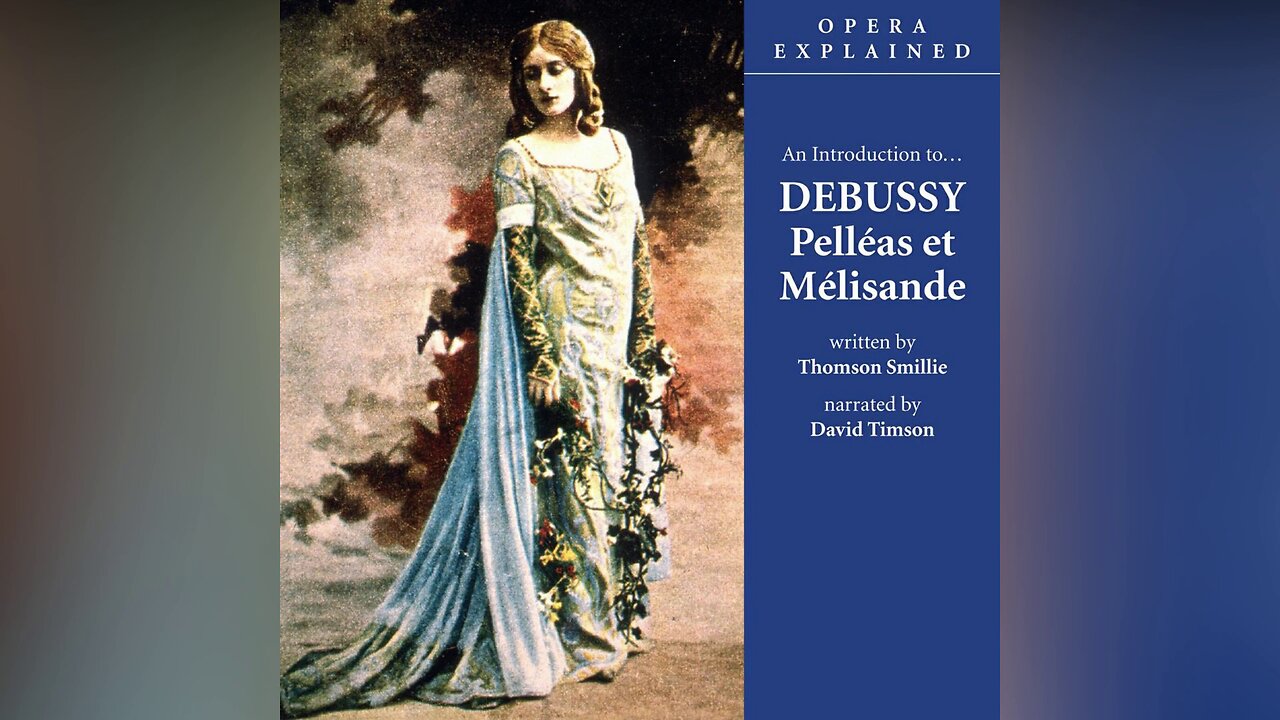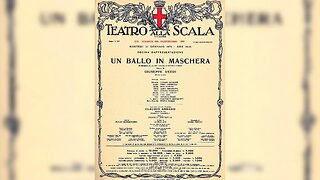Premium Only Content

Opera Explained | Pelléas et Mélisande by Debussy (Audio)
"An Introduction to...Debussy - Pelléas et Mélisande" written by Thomson Smillie, narrated by David Timson.
Dating from the last decade of the nineteenth century, Pelléas et Mélisande points the way into the twentieth century. The score is hauntingly beautiful, but there is more to the work than shifting panels of elusive, impressionistic sound. Debussy retains the text of Maeterlinck’s play, allowing its linguistic subtleties to be matched perfectly by the musical detail. Taking a little time to explore the romantic, elusive world of this opera is particularly rewarding.
Prince Golaud has married a waif-princess Mélisande and brought her home to the gloomy castle of his grandfather King Arkel, where she meets and eventually falls in love with Golaud’s half-brother Prince Pelléas. Golaud’s suspicion and mounting jealousy are the driving force of the drama. It culminates in a love scene as impassioned in its understatement as Tristan’s more full-blooded outpourings; and the eventual murder of Pelléas and slow death of Mélisande are as deeply affecting as anything inWagner’s great love/death drama Tristan und Isolde. Comparisons between these two works are inevitable, and it is not surprising that Debussy’s impressionistic masterpiece has been dubbed ‘the French Tristan’. The literary source of Debussy’s masterpiece was a play of the same title by the Belgian poet, playwright and philosopher Maurice Maeterlinck. When Debussy attended a performance of the play he asked permission to set it, realising that its subtle use of language, its qualities of understatement and its deeply atmospheric mood exactly suited his developing musical style. He made some cuts in the text but otherwise retained the language of the play and no attempt was made to recast the text in verses suitable for musical setting. The result is a work in which the special cadences, patterns and flow of the French text are perfectly matched by the music, causing some people to refer to Pelléas et Mélisande as ‘the most perfect opera ever written’. Of course there is no such thing – everyone has an opinion on which opera qualifies for that title – but there is no doubting that if opera, music drama, music theatre, call it what you will, is to be defined as a perfect marriage of words and musical expression then the candidacy of Pelléas et Mélisande for the title is assured.
However, Debussy’s masterpiece is admired for more than just its musical historical significance; indeed, this alone would not be enough to justify its place in the repertory. The qualities of orchestral scene-painting so admired in the composer of L’après midi d’un faune and the tone poem La Mer are brilliantly in evidence as Debussy depicts the gloom and menace of the old castle, the effects of moonlight on water, the shifting power of the sea, and the mounting sexual attraction of the ardent Pelléas for the gentler Mélisande. The beauty of the French language and the subtle power of vocal expression are sensuously expressed in this evocation of a romantic and elusive world.
Tracklist:
- Background
- Introduction to Claude Debussy
- The influence ofWagner and atonality
- Debussy’s childhood and development
- Maurice Maeterlinck
Pelléas et Mélisande:
- The story and opening
- Golaud encounters Mélisande
- King Arkel’s acceptance and the entrance of Pelléas
- Pelléas and Mélisande together
- Golaud lies ill
- Mélisande at the window and Golaud’s suspicion
- Golaud uses Yniold
- Act IV: Pelléas to depart; Arkel and Mélisande; Golaud’s anger
- Yniold’s scene; the love duet
- Pelléas: ‘We have broken the ice with red hot irons’
Performance:
Mélisande: Mireille Delunsch, soprano
Pelléas, Arkel’s grandson: Gérard Théruel, baritone
Golaud, Arkel’s grandson: Armand Arapian, baritone
Arkel, King of Allemonde: Gabriel Bacquier, bass
Geneviève, mother of Pelléas and Golaud: Hélène Jossoud, mezzo-soprano
Yniold, Golaud’s son: Françoise Golfier, soprano
Le médecin, Le berger: Jean-Jacques Doumène, bass
Choeur Régional Nord/Pas-de-Calais
Eric Deltour, chorus-master
Orchestre National de Lille-Région Nord/Pas-de-Calais
Conducted by Jean-Claude Casadesus
-
 2:50:06
2:50:06
Adaneth - Arts & Literature
1 month agoVerdi: Un Ballo in Maschera | Pavarotti, Cappuccilli-Abbado, Zeffirelli (La Scala 1978-ENG&ITA SUB)
93 -
 DVR
DVR
SpartakusLIVE
6 hours ago#1 Verdansk Sniper gets HACCUSATIONS because of INSANE Headshots
35K3 -
 46:18
46:18
SB Mowing
2 days agoShe was LOSING HOPE but this SURPRISE CHANGED EVERYTHING
10.5K37 -
 LIVE
LIVE
ItsLancOfficial
5 hours agoWE LIVE 🔴WE LIVE 🔴 SUNDAY SUNDAYS!!!!!!! TARKOV
622 watching -
 4:09:32
4:09:32
EricJohnPizzaArtist
6 days agoAwesome Sauce PIZZA ART LIVE Ep. #59: Are You Ready for some FOOTBALL with GameOn!
10.3K7 -
 1:21:43
1:21:43
Jake Shields' Fight Back Podcast
11 hours agoJake Shields and Paul Miller!
43.5K83 -
 1:20:41
1:20:41
TRAGIKxGHOST
2 hours agoTrying to get SCARED tonight! | Are You SCARED!? | Screams Beyond Midnight | Grab a Snack
6.17K2 -
 LIVE
LIVE
StuffCentral
4 hours agoI'm baaack (no you can't play with me.. unless you a healer)
133 watching -
 2:25:11
2:25:11
TheSaltyCracker
5 hours agoTrump Is Not Dead ReEEeStream 8-31-25
70.9K109 -
 3:09:16
3:09:16
THOUGHTCAST With Jeff D.
3 hours ago $0.67 earnedLabor Day Weekend FORTNITE With THOUGHTCAST Jeff & the squad
11.7K4